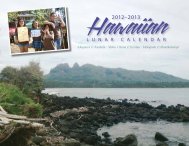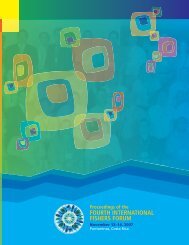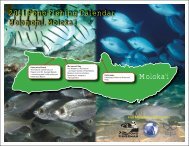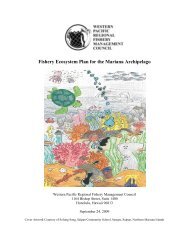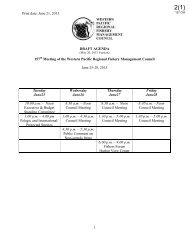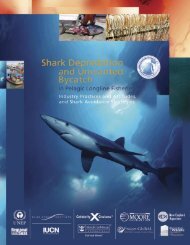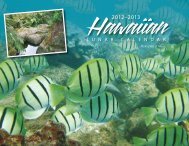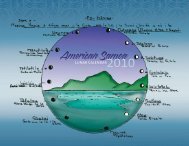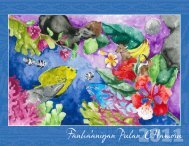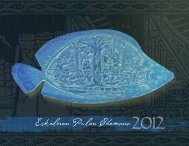Hawaii FEP - Western Pacific Fishery Council
Hawaii FEP - Western Pacific Fishery Council
Hawaii FEP - Western Pacific Fishery Council
You also want an ePaper? Increase the reach of your titles
YUMPU automatically turns print PDFs into web optimized ePapers that Google loves.
1.7.2 Community Groups and ProjectsAs described above, communities and community members are involved in the <strong>Council</strong>’smanagement process in explicit advisory roles, as sources of fishery data and as stakeholdersinvited to participate in public meetings, hearings, and comment periods. In addition, cooperativeresearch initiatives have resulted in joint research projects in which scientists and fishermenwork together to increase both groups’ understanding of the interplay of humans and the marineenvironment, and both the <strong>Council</strong>’s Community Development Program and the CommunityDemonstration Projects Program foster increased fishery participation by indigenous residents ofthe <strong>Western</strong> <strong>Pacific</strong> Region.The <strong>Council</strong> is sponsoring the Hoohanohano I Na Kupuna (Honoring our Ancestors) conferenceseries in partnership with the Association of <strong>Hawaii</strong>an Civic Clubs and in consultation with thenative <strong>Hawaii</strong>an community. The conference has received the support of the KamehamehaSchools/Bishop Estate, Office of <strong>Hawaii</strong>an Affairs, various departments of the State of <strong>Hawaii</strong>,the <strong>Hawaii</strong> Tourism Authority and numerous community organizations and projects throughoutthe State of <strong>Hawaii</strong>. <strong>Fishery</strong> ecosystem management provides the <strong>Council</strong> with the opportunity toutilize the manao (thoughts) and ike (knowledge) of our kupuna (elders) – ideas and practicesthat have sustained na kanaka maoli (native <strong>Hawaii</strong>an) culture for millennia.The conference series was initiated by the <strong>Council</strong> to engage the Kanaka Maoli community inthe development of the <strong>Hawaii</strong> Archipelago <strong>FEP</strong> and to increase their participation in themanagement of fisheries under the <strong>FEP</strong>’s authority. A series of workshops with the KanakaMaoli community to promote the concept of ahupuaa (traditional natural resource unit)management began in 2003 through the AOHCC. This endeavor was continued by the <strong>Council</strong> inorder to take the ahupuaa concept to the next level, the development of a process to implementtraditional resource management practices into today’s management measures.Conference attendees, many of them native practitioners who continue traditional practices andrelationships with the natural environment taught to them by their kupuna, requested thattraditional resource management be incorporated into contemporary resource management andthat education play a major role in this effort. A motivation for the series was the often heardmanao that “we want to teach our keiki (children) a practice, not a memory.”The first conference (Puwalu I) was held in August 2006 and included over 100 ahupuaapractitioners who discussed the development of aha moku (traditional councils which governedone or more ahupuaa) that would manage natural resources for the aha moku through theimplementation of culturally based, site-specific conservation and utilization practices.The second conference (Puwalu II) was held in November 2006. At this conference culturalpractitioners and educators met and developed a declaration regarding the education of <strong>Hawaii</strong>’schildren, the development of appropriate consultation protocols, the customary and traditionalrights of na kanaka maoli, and a commitment to further action as follows:Having met to deliberate on how to incorporate traditional <strong>Hawaii</strong>an practices and knowledge,into the daily education of Hawai‘i’s children;22



